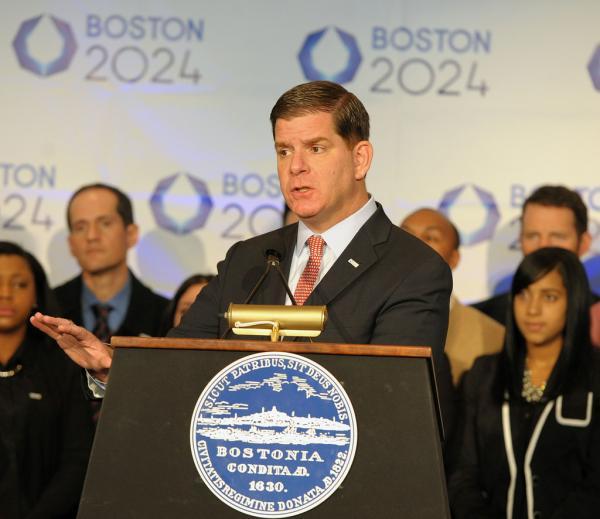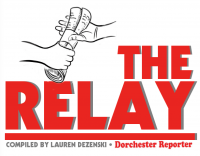April 2, 2015

Mayor Martin Walsh is shown during a press event announcing the news of Boston's selection by the USOC. Photo by Isabel Leon/Mayor's Office
For three months now, it’s the one question that has vexed local observers— including those of us at The Reporter— more than any other: How much will it cost state taxpayers to fix local roads and MBTA stations (such as JFK-UMass station and Kosciuszko Circle) that are critical to siting the Summer Games in the city of Boston?
 The RelayAt first, Boston 2024 officials insisted that NO new public dollars would be needed at all, since the projects they envisioned were already in the pipeline through a 2014 transportation bond bill.
The RelayAt first, Boston 2024 officials insisted that NO new public dollars would be needed at all, since the projects they envisioned were already in the pipeline through a 2014 transportation bond bill.
When the Reporter pointed out that those projects are not yet funded— and, in fact, don’t yet exist as projects— the 2024 camp re-trenched to a new position, that, in fact, these projects aren’t essential to running the Games. Sure, they’d be nice, but if they don’t get funded and built, we can do without them. Come again? You’re going to build a 100-acre Olympic Athletes Village on traffic-choked Columbia Point and NOT rebuild the road system or upgrade the decades-old Red Line station?
Well, we’re not the only ones who found that claim ridiculous.
You can count Mayor Marty Walsh among the Dorchester residents who say that those infrastructure fixes will absolutely need to happen if the Games come to town.
In an exclusive interview with the Reporter today, Mayor Walsh said he will demand that such upgrades be part of any Olympic deal. And, yes, the Mayor acknowledged, that will come with a cost to taxpayers.
“We’re absolutely going to need state and probably city money for infrastructure,” said Walsh. “And some would probably come from [a] bond bill, but there’ll probably need to be another appropriation.”
There is no wiggle room, as far as Walsh is concerned, on whether the Games could get done without fixes to Morrissey Boulevard— and in particular Kosciuszko Circle.
“I’ve made it perfectly clear that Kosciuszko is an opportunity to get reconstructed if the Olympic Village were to go to Bayside. As resident of Boston and Dorchester, I'd insist that they’d have to fix them with the sheer volume of people for that three week period. You need to upgrade the infrastructure.”
Walsh says he thinks that the Olympics will be the “catalyst” needed to finally get roadway improvements — including some that he fought to push through as a young lawmaker in the 1990s.
“Whether or not we get the Olympics, Kosciuszko Circle needs to be fixed and there’s going to be state and in some cases city money needed. This conversation, even without the Olympics, the conversation has to be had. We had the Morrissey plan [back in the 1990s] and we weren’t able to get it funded.”
“It’s the same with the MBTA. It forces a real serious conversation about the MBTA and Kosciuszko Circle and Widett Circle.
Walsh: Conversation Has to Change
Boston 2024 has been dying a death of a thousand cuts over the last three weeks. Most of those cuts have been self-inflicted— and Mayor Walsh knows it.
Walsh says it’s time to change the tone of the conversation.
“I think that the last three weeks have certainly been challenging as far as having a conversation,” said Walsh. “Now its time to have a true conversation about what it means for the city of Boston.”
The mayor says that the latest controversy — centered on whether the Boston 2024 Chairman John Fish should stay in place as the face of the movement— is, in part, a media screw-up.
“I didn’t say that John Fish should go,” said Walsh, referring to an article that appeared in today’s Boston Herald. “The paper took me out of context. I said he was an ambassador. This 2024 USOC needs to grow in terms of more experts who understand the bid. This is a Fortune 500 company that’s being created here but it also has to have the public’s full faith. Now’s the time to switch the conversation.”
“What’s happening today, it's not happening in a positive light and I’m not happy with that.”
Walsh said he is comfortable that the USOC is still committed to sticking with the Boston bid, despite a Wall Street Journal article that suggested otherwise.
“I've spoken to [the USOC] and they made it clear to me that they are committed to us,” Walsh said.
Changing the conversation— and, by inference, getting out a pro-Olympics message—won’t be easy for Walsh’s team. The community meetings that the city has convened to date, he says, have been dominated by anti-Olympics voices.
“When you have one side dominating the crowd, it’s not a true process,” Walsh told the Reporter. “Let the actual community ask the questions.”
The mayor said that supporters of the Olympics bid will need to make their case in a more intimate setting— one that Walsh- as a former civic association president can relate to.
“We’ve been doing some of that already, going out to civic groups and having conversations in more intimate groups. We need to bring it to the Popes Hills and Codman Square and Four Corners and Columbia-Savin Hill. That’s where the conversation needs to happen. Those are the people invested in the civic process—and that’s where the information needs to get out.”
Topics:
Tags:



